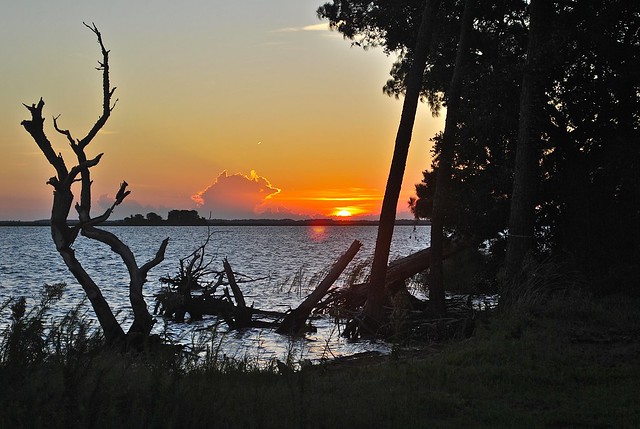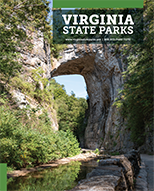Open fires are prohibited throughout the park from midnight to 4 p.m. through April 30 per the 4 p.m. Burning Law. This includes wood and charcoal. Gas is permissible. Campground fires are allowed during the restricted time if a camp host is on duty and signage to that effect is posted in the campground. Failure to observe the 4 p.m. Burning Law can result in a fine. Contact the Park Office for additional information.
Read Our Blogs
A Trip to a Beach Where the Wild Things Are
Posted September 19, 2016 | Updated July 7, 2020
Every time I go to a Virginia State Park something amazing happens. I never quite know what it will be, but I steer the sails where I want to explore and let the winds guide me from there.
You never know what you may experience, and that is a wellspring of joy for one who spends time in nature. After an amazing bioluminescent adventure, I wanted to return to my favorite beach in Virginia, so a primitive camping trip to False Cape State Park was in order.
Rainbow and dunes at False Cape State Park.
Little moments can sometimes be the biggest and the most memorable.
Catching a glimpse of the moon rising over the ocean, watching the clouds wash over with color from a setting sun, hearing an owl call in the darkness, sharing a laugh with friends, seeing an unexpected rainbow, feeling the cool sand on your feet after a hot day; all these little gems of moments become engrained in us like little grains of memory which make the beaches and landscapes and topography of our lives.
There is joy in wild places one cannot find in the city. There are tranquility and familiarity in a forgotten world. A stillness reminding us it is normal to go slow, to observe the little things, and not always be on the move.

The great blue heron is a symbol of patience.
Naturalists and many people learn to listen to the sounds and signs of nature and become privy to one of the most magical realms, the outdoors surrounding us. Nature holds countless opportunities to expand our understanding and appreciation of the world.
We feel separate, isolated at times in our rooms, homes, and offices. In nature, we are reminded we are part of a great web. Walking outside the animals know we are there. If you slow down and learn to hear their signs and signals, you can tell. And you learn how to hear their responses. Birds communicate depths of knowledge about an area and the predators and prey passing through.
We never caught sight of the secretive yellow-billed cuckoo, but we heard it frequently, along with indigo buntings, wrens, screech owls, towhees, and more in the maritime forest that transitions to dunes and the ocean.
It was oppressively hot the first day, difficult to do much directly in the sun for long. But as the sun lowered the atmosphere changed. We visited Back Bay National Wildlife Refuge for sunset alongside a constant, strong breeze, turning the sometimes-peaceful Bay into choppy windswept water. An egret popped out the grasses and flew off to another spot, it’s white body stark against the green and blues surrounding us. Clouds looked like different cartoon shapes growing pink and silver edges as the sun sank on another day.
Sunset over the bay at Barbour Hill boat dock.
The nearly full moon soon took over and we were able to make out four planets along the ecliptic; Venus and Jupiter near the horizon and Saturn and Mars near the constellation Scorpius. They took the stage before a few brighter stars finally emerged into view as twilight waned but the nearly full moon stole the show.
Day 2
A simple joy came in the rain. Lightning lit up the clouds out over the ocean putting on quite a show. While it rained, we took refuge under a large tarp/kitchen fly at our camp. Collecting the rainwater as it poured off, we quenched our thirst and brewed tea from this freshwater, liquid gold near the salty ocean.
I was a little bummed the rain would probably prevent me from seeing the full moon rise over the ocean. The rainwater that drained from our tarp was pooling up slightly near the picnic table so I dug a subtle channel with an oyster shell for the water to drain away. A couple of minutes later I noticed a small turtle in the channel. Then the sand started moving slightly.

The caruncle, or egg tooth, on their beak helps them break free of their egg. It falls off shortly after birth.
Soon after another turtle popped out the sand! Evidently a box turtle had laid eggs in the sand of our campsite. They could have broken free the day we arrived and a day or two after breaking free of their eggs they had finally reached the surface. It was an important reminder we sometimes think we are somewhere by ourselves and there is life happening right under our noses that we overlook or can’t see.
Covered in sand the newborns sat and moved slow, exhausted from digging their way to freedom. I was in awe and amazement. I had evidently uncovered the final couple inches of their journey to the light. One climbed over the wood railing and fell backward, landing upside down and wiggling its head and feet trying to flip itself back over.

Not all animals are born skilled climbers.
One of its siblings got a jolt of energy and sped right by the turtle, heading on its own path of dispersal, spreading out in the area. It finally got back on its feet only to fall over a small branch later. Climbing is a skill that takes time, but trial and error are some of the best teachers for animals. Box turtles get good at it, having claws for digging and climbing.
A couple more turtles emerged during and after the rain that evening. A typical clutch size for this species is 4 or 5 eggs. It was a special sight I will never forget, seeing these tiny box turtles face the world for the first time.
Day 3
At sunrise, we quickly noticed the high tide was approaching and fish were jumping around the waves. Lots of fish. Hundreds upon hundreds of them. Menhaden and pompano swam the surface as well as blue and puppy drums lurked. We weren’t the only ones who took notice.

A dolphin breaks the surface as the sun rises.
A couple of pods of dolphins paralleled the shore, curving out the water so smoothly, taking another breath of air before submerging.
The fish get into tighter and tighter spots, and the bait balls change the color of the water noticeably. Birds took notice and interest as well. Dolphins would flap their tails and try to corral the prey, going after small groups of fish that diverged from the safety of the jumping school.

Dolphins fish with group coordination.
Putting my ear underwater, I could hear the clicks and whistles, the sonar and communication of these intelligent marine mammals. What were they saying to one another? They hunt fish with tactics and group maneuvers, and communication is key for such levels of intelligence, planning, and social behavior, which enhance fitness, success, and a full belly. We dined on a few fish for brunch ourselves that was caught with a fishing pole.

A fisherman casts his line into the ocean.
Waves grow and recede, crash and curl, awaken and lull, a great giver and taker of life. The ocean is one of our biggest resources and is a foreign world to many of us. Having spent most of my life in the Piedmont and mountains, my knowledge of the oceans is mediocre at best. I have only begun to dip my toes into the vast sea of happenings under that salty water that helps guide much of our planet’s climate, international commerce, fisheries, other resources, and cycles of our interconnected ecosystems.
Along with land wildlife was abundant.
Butterflies fluttered throughout the woods along the main vein of False Cape. Dozens of swallowtails bounced around.
This tiger swallowtail wasn't shy at all, landing on me for a moment.
The tiger swallowtail is the Virginia state insect.
I love how nature can stop you in your tracks and everything revolves around one flower, animal, or insect sometimes - mesmerized by the patterns and delicate beauty before it flitted off and rode the breeze away.
A couple of monarchs were spotted as well, fueling up for their epic multi-generational migration.

Monarchs require milkweed flowers for their survival.
Wild places, farms, and even certain backyards where the right plants grow or are grown serve as critical refueling stations for this creature as habitat shrinks and development marches on.
Biking along the main vein of the park, I saw one of Virginia's three venomous snakes. It quickly moved away into the bushes, wanting nothing to do with me.

Cottonmouths, or water moccasins, are important members of this marsh community.

Tracks reveal another important player of the maritime forest and dune ecosystem.

The exuviae, or shell, of a cicada reveals another part of the live oak forest.
I saw such an array of dragonflies adorning different colors and wing patterns. I like them all, especially because they eat mosquitos.
Dragonflies are both small predators and prey.
The sun was oppressively hot at times and swaths of the day I was contained to the shade and relative cool of my campsite during those few dog days of summer. I wondered how much wildlife I would be able to observe within the confines of a heat index in the triple digits. But there were still many surprises and experiences.
From coyotes yelping at the full moon when it finally broke free of the clouds, to the screech owls whinnying through the woods, the night became a nice time to enjoy the sights and sounds. The live oaks surrounding our campsite stayed darker under the canopy of leaves, but once you walked to the dunes or beach, everything brightened into a muted day illuminated by the moon.

The nearly full moon lighting the beach through the clouds.
Once the moon broke free of the clouds, the beach and dunes shined with tremendous detail. Frogs, cicadas, and other insects turned on the nocturne orchestra, and a soft breeze made everything feel relieving and tranquil. As sea oats danced along the dunes swaying to the rhythm of the wind, the ocean churned wave after wave of a never-ending lullaby.
Learn more about False Cape State Park here. For information about primitive camping click here, and then call 800-933-7275 as reservations cannot be made online for this unique park.
Posted September 19, 2016 | Updated July 7, 2020
If you have read the article and have a question, please email nancy.heltman@dcr.virginia.gov.
Search for blogs
By Park
Categories
Cabins
Camping
Fishing
History and Culture
Other
Programs and Events
Trails
Volunteers
Water Fun
Archive
2024
2023
2022
2021
2020
2019
2018
2017
2016
2015
2014
2012





















